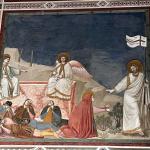These are notes from the sermon I preached at Jubilee last Sunday. They are shorter than usual, but I thought I’d share the outline with you anyway. You can listen to the sermon by downloading it or you can listen to it here:
I. HOW TO LIVE FOR THE FUTURE—Philippians 1:1-11
- Know Who You Are (verses 1-2)
- A slave of the RISEN Jesus (NOT man) and saints—i.e. set apart and being cleansed.
- Conduits of grace and peace.
- Know Where You Are Going (verse 6) BE SURE!
- Know Who You Are Going With — Long-term, heart-felt partnership (verses 5, 7, 8)
- Know What You Are Meant To Do On The Way
- Verse 5—“In the gospel,” i.e. live in the good of it and live for its progress, don’t just keep the chair warm! What do we do in its good …
- Verse 3—Thankfulness that comes from remembrance.
- Verse 4—Prayer that is joyful and full of anticipation.
- Verse 9—Abounding, growing love.
- Verse 9—Desire to study. We will spend eternity with . . .
- Verse 9-10—Resultant wisdom/discernment, i.e. the ability to lovingly apply to life the things we learn.
- ALL of this results in verses 10-11—Purity that honors God.
II. RESULTS OF LIVING FOR THE FINAL DAY (Philippians 1:12-17)
- Verse 12-14—Confidence that comes from knowing even tough times are for our good, e.g. prison making confident!
- Verse 14—Boldness to declare this wonderful news!
- Verse 15-17—Preoccupation with the advance of the gospel above all partisanship, etc.
- Verse 17-20—Rejoicing, eager expectation, hope, “full of courage”, honor to Christ.
- Verse 21-30—Glorious indifference to our own life and its sufferings. “Through many tribulations we must enter the kingdom of God” (Acts 14:22) Let’s study to be prepared to die well.
CONCLUSION
Live a worthy life and fight for the gospel—“It’s all about Jesus!”
BACKGROUND QUOTES
“Hence we have a service which is not a matter of choice for the one who renders it, which he has to perform whether he likes or not, because he is subject as a slave to an alien will, to the will of his owner . . .
[The slave is one] who not only has no possibility of evading the tasks laid upon him, but who also has no right of personal choice, who must rather do what another will have done, and refrain from doing what another will not have done.”
Theological Dictionary of the New Testament, Vols. 5-9, edited by Gerhard Friedrich. Vol. 10 compiled by Ronald Pitkin, Ed. Gerhard Kittel, Geoffrey William Bromiley, and Gerhard Friedrich, Electronic Ed., 2:261 (Grand Rapids, MI: Eerdmans, 1964-c1976).
“He is not merely putting up with his circumstances, he is going beyond that, he is exulting in his suffering. He is triumphant, he is jubilant. There is a marvellous element in this, he tells them, if they can but see it. This is characteristic New Testament teaching . . . Do not waste your tears on me or on my condition, says the Apostle.”
David Martyn Lloyd-Jones, Studies in Ephesians—The Unsearchable Riches of Christ, Chapter 3, p. 17 (Grand Rapids, MI: Baker Book House, 1972).
“Death was nothing to these apostles. They had already passed from death to life. Having passed from judgment to life in Him, they were not afraid of death. They knew where they were going—they were going “to be with Christ; which is far better” (Philippians 1:23).”
David Martyn Lloyd-Jones, Courageous Christianity, 1st U.S. ed., 173 (Wheaton, IL: Crossway Books, 2001).















